Political Report
Efforts to Legalize Marijuana Move Forward
On Tuesday, voters legalized marijuana while electing DAs who have pledged to curb prosecutions and governors who favor legalization.

Daniel Nichanian
The movement to legalize marijuana had a lot riding on Election Day, and it scored a number of important victories.
In Michigan, voters approved a referendum that legalizes marijuana for recreational use. They also elected a Democratic governor (Gretchen Whitmer) and Attorney General (Dana Nessel) who both backed legalization, which could ease implementation. The measure will allow people to possess up to 2.5 ounces of marijuana, and set up a taxed system of commercial businesses.
Michigan’s initiative does not contain a provision to expunge past marijuana-related convictions. But Whitmer has already said since her victory that she will push for expungement legislation and consider executive action as well. “I think that the people of Michigan have said that for conduct that would now be legal, no one should bear a lifelong record for that conduct,” she said on Wednesday. Nessel supports such reform as well, and state Representative Sheldon Neeley, a Democrat who represents Flint, has introduced a bill to this effect. The Appeal: Political Report will keep track of these debates going forward.
North Dakota, however, rejected a referendum to legalize marijuana. Missouri voted to legalize medical marijuana, the second state to do so this year after Oklahoma did so in June. (Utah also voted on legalizing medical marijuana, but the results of the referendum were not yet known as of Thursday.)
Victories by gubernatorial and legislative candidates who support legalizing marijuana altered many states’ political landscape around the issue. JB Pritzker, Michelle Lujan Grisham, and Ned Lamont will be the new pro-legalization governors of Illinois, New Mexico, and Connecticut, respectively; each will govern with a Democratic legislature. In New York, where Democrats captured full control of the state legislature, City & State New York expects marijuana legalization to at least be under discussion.
In elections for prosecutor, many candidates ran on promises to limit, if not eliminate, marijuana charges, or else to treat these cases as civil infractions instead of criminal offenses.
In Dallas County, Texas, John Creuzot, a Democrat, defeated District Attorney Faith Johnson; Creuzot has said that he would no longer charge first-time marijuana possession cases. Marijuana possession represents a large share of criminal filings in the county (10 percent since 2017). In Bexar County, the next district attorney will be Joe Gonzales, a Democrat who campaigned on strengthening the county’s cite-and-release program. And in Suffolk County, Massachusetts (Boston), Rachael Rollins was elected prosecutor on Tuesday after announcing during the campaign that her default policy would be to not prosecute any drug possession charges at all.
In fact, Rollins publicized a broader list of charges that she typically would not prosecute. Sarah Lustbader wrote about Rollins’s embrace of declinations in the Daily Appeal in September. “Declinations stand in stark contrast to drug courts and probation, which often carry the threat of years of incarceration that are often imposed automatically for even a minor drug relapse,” Lustbader wrote.
That said, there were a number of major elections where marijuana legalization or the racial disparities of marijuana arrests featured prominently because of a challenger’s campaign, but where the incumbent won. One such election, which I profiled last week, was that for Hennepin County Attorney. (This is the Minnesota county that contains Minneapolis.) Incumbent Mike Freeman, who generally expressed confidence in the county’s justice system on the campaign trail and rejected the view that mass incarceration exists in Minnesota, beat challenger Mark Haase. In elections for governor in Florida and Maryland, Ron DeSantis and incumbent Governor Larry Hogan won respectively against Andrew Gillum and Ben Jealous, the Democratic nominees whose ambitious platforms included marijuana legalization, among many things.
